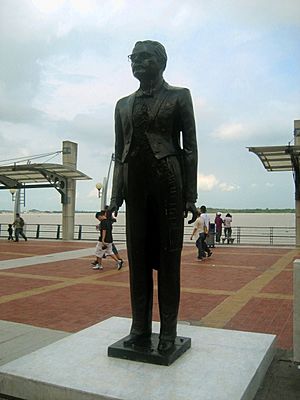Carlos Alberto Arroyo del Río facts for kids
Quick facts for kids
Carlos Alberto Arroyo del Río
|
|
|---|---|
 |
|
| President of Ecuador | |
| In office November 18, 1939 – December 10, 1939 |
|
| Preceded by | Aurelio Mosquera |
| Succeeded by | Andrés Córdova |
| President of Ecuador | |
| In office September 1, 1940 – May 28, 1944 |
|
| Preceded by | Julio Enrique Moreno |
| Succeeded by | José María Velasco Ibarra |
| Personal details | |
| Born | November 27, 1893 Guayaquil, Ecuador |
| Died | October 31, 1969 (aged 75) Quito, Ecuador |
Carlos Alberto Arroyo del Río (born November 27, 1893 – died October 31, 1969) was a very important political leader in Ecuador. He served as the President of Ecuador from 1940 to 1944. He was a member of the Ecuadorian Radical Liberal Party, a political group that believed in certain freedoms and changes for the country.
During his time as president, Ecuador faced some big challenges. One of the most significant events was the 1941 Ecuadorian–Peruvian War, which resulted in Ecuador losing some territory. Later, there were many protests from the people, and he had to leave his position as president.
Contents
Early Life and Education
Carlos Alberto Arroyo del Río was born in Guayaquil, Ecuador. This city is a major port and a very important place in Ecuador. From a young age, he showed great interest in learning and public service.
He studied law and became a successful lawyer. His skills in law and his ability to speak well helped him gain recognition. These talents were very useful in his later political career.
Political Career Before Presidency
Before becoming president, Carlos Alberto Arroyo del Río was active in Ecuadorian politics for many years. He was a member of the Ecuadorian Radical Liberal Party. This party was known for its ideas about progress and change.
He served in different important roles within the government. He was even the president of the Senate of Ecuador and the Chamber of Deputies of Ecuador. These roles showed his leadership skills and his growing influence in the country's political scene.
First Short Term as President (1939)
Carlos Alberto Arroyo del Río first became president for a very short time in 1939. This happened after the previous president, Aurelio Mosquera, passed away. Arroyo del Río took over as an interim (temporary) president.
This first term lasted only a few weeks. It was a brief period where he helped manage the country's affairs during a difficult transition. After this, a new election was prepared.
Main Presidency (1940-1944)
Carlos Alberto Arroyo del Río was elected president again and began his main term on September 1, 1940. This was a challenging time for Ecuador and the world. World War II was happening, and it affected many countries.
The 1941 Ecuadorian-Peruvian War
One of the most difficult events during his presidency was the Ecuadorian–Peruvian War in 1941. This was a conflict over land between Ecuador and its neighbor, Peru. Unfortunately, Ecuador lost the war.
This loss had a big impact on the country. It led to a peace agreement called the Rio Protocol. This agreement set new borders between Ecuador and Peru.
Challenges and Public Unrest
During his presidency, there were growing problems within Ecuador. Many people were unhappy with the government's decisions. There were also concerns about how the country was being run.
The public's dissatisfaction grew over time. Eventually, large protests and demonstrations took place across the country. These protests showed that many citizens wanted a change in leadership.
End of Presidency
Due to the widespread public unhappiness and protests, Carlos Alberto Arroyo del Río had to leave office. He resigned on May 28, 1944. This event was a significant moment in Ecuadorian history, showing the power of the people's voice.
After his presidency, he moved away from direct political leadership. He continued to be a respected figure in legal and political circles.
Later Life and Legacy
Carlos Alberto Arroyo del Río passed away on October 31, 1969, in Quito, Ecuador. He is remembered as a president who led Ecuador during a very difficult period. His time in office was marked by both national challenges and important political changes.
His legacy includes his efforts to modernize Ecuador and his role in the Ecuadorian Radical Liberal Party. He is also remembered for the significant events that happened during his presidency, especially the 1941 war and the public uprising that led to his departure from office.
See also
 In Spanish: Carlos Arroyo del Río para niños
In Spanish: Carlos Arroyo del Río para niños

